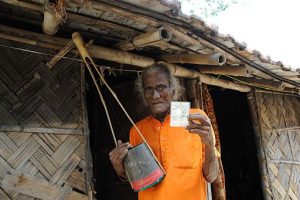Randomised Control Trials
Our programme involves over 30 full-scale and pilot study Randomised Control Trials, which aim to contribute to policy changes that promote development-related goals in a more efficient and effective manner.
Research projects are listed below, or click Read More to find out more about this research activity.
Read MoreUsing Machine Learning to Promote Fairness and Efficiency in Indian Courts
Biased or slow rulings from judges have serious economic and welfare consequences, including a harmful environment for business. Courts in developing countries face numerous challenges in providing fair and efficient justice to citizens and firms. The challenges include: legal codes…
Relaxing Credit Constraints and Tenure Insecurity in Imperfect Markets
Issue: The 2013 World Bank report “Securing Africa’s Land for Shared Prosperity” states that more than 90 percent of Africa’s rural land is undocumented, making it vulnerable to corruption, land grabbing and expropriation. Helping citizens better secure property and land titles…
Using Digital Trails to Improve Management and Accountability for Public Service Delivery
Issue: Delays in receiving wage payments reduce poor rural households’ ability to manage economic uncertainty and meet their subsistence needs. This is a particularly dire concern for the 50 million impoverished rural households who rely on the payments from India’s…
Randomized Inspections and Information Campaigns
Randomized Inspections and Information Campaigns: Impact on Compliance to the use of Electronic Fiscal Devices (EFDs) in Tanzania Issue: Governments across East Africa mandate that businesses use electronic fiscal devices (EFDs) to increase VAT tax compliance. These devices directly transmit…
The Political Economy and Governance of Rural Electrification
Issue: Many developing country governments lack the capacity to directly implement large infrastructure and service delivery projects, instead hiring private contractors to perform public sector responsibilities: at 14.5% of GDP, low-income countries have the highest share of public procurement in…
Improving property tax collection in South Delhi
Improving property tax collection in South Delhi: Reducing property owner and monitor incentives to misreport Issue: Increasing tax revenue can improve the ability of public institutions to finance services for citizens. However, a fundamental constraint common in developing countries is…
Access to Justice in Kenya’s Magistrates’ Courts
Access to Justice in Kenya’s Magistrates’ Courts: Judicial Decisions as Public Goods Issue: Inefficiencies and lack of accountability in Kenya’s over-burdened and under-resourced magistrates’ courts result in wide disparities in the quality and application of justice. In 2016, for example,…
Monitoring the Performance of Agents in Public Service Delivery
Issue: India’s state-run electricity distribution companies (discoms) often lose up to half of the power they are supposed to supply to customers to theft, losses and non-payment. Despite these inefficiencies and corruption, electricity distribution cannot be wholly privatized to improve…
Beyond the Paycheck – Motivational tools for public school teachers
Issue: The performance of frontline public sector workers is a significant problem in developing countries where low attendance and effort limit the value of service delivery, thereby diminishing well-being and economic development. Poor performance of public school teachers remains a…
Engaging Citizens to Address Company-Community Conflict at South African Mines
Issue: Despite being a major source of employment, exports, and tax revenues, mining areas are often sites of protests, riots, and other forms of social conflict: between 2010 and 2013, South African police recorded over 10,000 crowd incidents near commercial…
Performance-Based Incentives in Multi-Layered Organizations
Performance-Based Incentives in Multi-Layered Organizations: Evidence from Sierra Leonean Community Health Workers Issue: Access to adequate healthcare remains a key challenge in many developing countries. This is particularly true in rural villages of Sierra Leone, where access to health facilities…
Training Politicians to Better Serve
Issue: India, a developing country with a strong and vibrant democracy, exhibits many elements of weak institutions and associated problems of ineffective governance. Both state and national legislatures are characterized by high levels of corruption, criminality, and poor performance. At…
Audit Selection under Weak Fiscal Capacity
Issue: Well-targeted tax audits are critical to deter tax evasion. In many advanced economies, the selection of which firm to audit is based on risk-based analysis systems. This require high levels of fiscal capacity to obtain the data, manage and…
Who is Bogus? Catching Fraudulent Firms in Delhi
Issue: A common VAT tax evasion strategy in low compliance environments involves fraudulent “paper” firms that allow other firms to reduce their tax liabilities. Identifying these fraudulent firms can potentially help recover lost tax revenue, but locating them is a problem for…
Measuring the Effect of Technological Improvements and Compliance Nudges on Property Taxes
Evidence from a field experiment in Senegal Issue: Rapid urbanization and the growth of real estate developments in low-income countries has increased the potential of property tax as a source of untapped domestic resource mobilization. Unfortunately, in most developing countries, property tax…
Constructing Compliance: Reducing Tax Evasion Among Market Traders in Ghana
Issue: The taxes and licenses required for traders to operate in local markets are some of the most commonly used state revenue collection instruments in Sub-Saharan Africa. However, businesses frequently evade these levies, choosing to operate in the informal economy….
Can Transparency Improve Preferences and Norms in the Public Sector?
Issue: Political norms and citizen preferences could be key enablers of the poor quality of public services in developing countries. Politicians may, for example, deprioritize public service delivery improvements because citizens prefer elected officials that offer them private benefits, including government jobs or…
Recruitment, Effort, and Retention Effects of Performance Contracts for Civil Servants
Drawing on experimental evidence from Rwanda primary schools Issue: Skilled and intrinsically motivated public sector employees are critical to state capacity and the provision of key services, including education. Yet the capability to recruit, motivate, and retain this profile of civil servants…
Bottom-Up Transparency Initiatives to Reduce Corruption
Issue: Transparency interventions frequently rely on a top-down approach in which a policymaker or external entity demands information about activity in a particular sector. Bottom-up transparency interventions differ by offering citizens the opportunity to directly initiate efforts to improve public goods or services….
Governance Capacity and Political Selection
Issue: The digitization of key government services — in this case, India’s National Rural Employment Guarantee Scheme — can streamline public service delivery and reduce the ability of politicians to misappropriate state funds. Political officials face challenges if they lack sufficient…
Politician Entry, Selection, and Performance in Sierra Leone
Issue: In regions which consistently support a single political party, the most important selection of a representative is typically at the primary stage. However, in developing countries, primaries are frequently dominated by elites and conducted without transparency, decreasing the likelihood that parties select…
Is Knowledge Power? Civics Training, Women’s Political Representation, and Local Governance in India
Issue: Women continue to be under-represented in political office, making up approximately only 22% of members of parliament worldwide. Despite this marginalization, little is known about how to increase women’s political participation and the role between women’s electoral representation and…
Institutional Reform and de facto Women’s Rights
Issue: In many socially-conservative settings, legal protections and provisions have frequently outpaced how administrators enforce these rules. In Pakistan, for example, government officials often use their own judgement and respond to local concerns when carrying out functions critical to women’s rights, including…
Community Policing and Public Trust: A Field Experiment in Uganda
Issue: Use of excessive force has diminished trust between citizens and law enforcement in many parts of Uganda. In an effort to improve this dynamic, the state is revisiting a “homegrown” model of community-policing that increases police presence through local patrols and community…
Community Policing and Public Trust: A Field Experiment in Colombia
Issue: Medellín, Colombia is a metropolitan area of more than 3.7 million people, and a place with long history of violence, pressing threats to citizen security, and improving—but still fragile—police-community relations. Lack of trust in the police and the consequent lack of…
Reforming Police Practices in India
Issue: The Indian state of Madhya Pradesh’s police force has a low officer to citizen ratio with multiple vacant positions, and a lack of representation of women in their ranks. Efforts have begun to make police forces more public-oriented, but…
Improving the Effectiveness of Labor Courts through Information and Conciliation
Issue: Mexican law requires that labor disputes should be adjudicated within three months, but, in practice, the country’s labor courts have several years of backlogged cases. This dysfunctionality creates uncertainty for workers and businesses, limits access to justice, and is…
Further information
Overall this research looks at the pressing need to improve the responsiveness and functionality of public and private institutions, which has motivated numerous governments and donors to actively support governance-promoting activities – from citizen information campaigns, to bureaucrat incentives and enhanced personnel policies. Many of these investments are producing gains for citizens in need of effective state services and economic opportunities. However, far too few of these initiatives have been linked to rigorous evaluations that allow stakeholders to identify what specifically is effective and show how a model might be replicated or improved. Moreover, few of the evaluations that do exist have been designed to generate conclusions beyond the specific contexts within which they were implemented.
The Scientific Committee for the RCTs is chaired by Ted Miguel from the CEGA at the University of California, Berkeley in close partnership with François Bourguignon, Research Co-Director of EDI. All research under this area is conducted in partnership with government or public institutions.


























